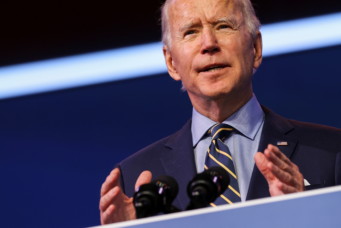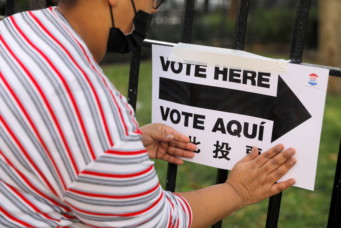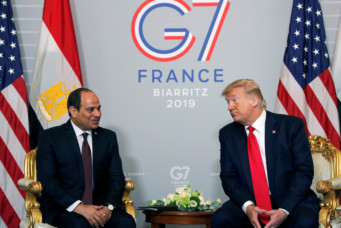Embracing Change: U.S. Foreign Policy Shifts
Former U.S. diplomat and American University in Cairo President Francis Ricciardone discusses whether a Biden win will see a return to a rules based international order.
October 22, 2020 Morry Gash/Reuters
This is the second installment of a three-part podcast interview looking at the state of American foreign policy hours before polls open on Election Day in the United States.
Cairo Review senior editor Sean David Hobbs sat with American University in Cairo President and former United States Ambassador to Turkey, Egypt, and the Philippines Francis J. Ricciardone Jr. for part two of a three-part series of podcast interviews today.
For part one, click here.
Cairo Review: As there was much public condemnation and criticism of Obama in Egypt during Obama’s presidency, how would Egyptian–American ties look if Biden wins?
Francis Ricciardone: I don’t think my speculation on this point is any more valid than anyone else’s. What’s important to do is listen to what both candidates are saying about foreign policy. And if you look for it, you’ll find they’re saying almost nothing because foreign policy doesn’t seem to be a big issue this election year.
Nonetheless, you will find policy papers, policy platforms, if you look hard enough online, the Democratic policy platform. And you will see statements and articles by advisors, particularly on the Biden side, who have been in government before and foreign affairs before: people like Samantha Powers or Susan Rice.
So, it’s worth going back to read what they are saying currently. If they’re saying anything or the contributions they make to the party platform, that will give you some idea of their outlook. But, what candidates say in a campaign and what they do in office aren’t usually precisely identical. There’s often a connection; but, particularly as the administration matures—say, after its first year—you find a lot of high rhetoric early on and then things sort of stabilize toward a norm over time.
Now, the Trump administration has been quite a deviation from that; not only in terms of his policy choices, but in the way he uses the national security apparatus, whether the military, intelligence, law enforcement, or the State Department. It’s been really out of the norm. His administration has really shaken things up. And, I would add, for better or for worse, he was elected because a good percentage of the American people—though not a majority of the voters, but about half the American people—felt that things needed to be shaken up in the establishment of government. They go so far to call it the deep state. I don’t share that perspective, but one has to acknowledge that a lot of Americans felt that way; that the foreign policy establishment was not reflecting hard core American needs as they saw it.
So, I think that, if former Vice President Biden wins, a lot of people expect a reversion to the norm in terms of American policy both toward other countries and the world. A rules based international order. That was the norm under Republican and Democratic presidents heretofore, and it’s a norm that President Trump has really shaken.
Another norm is the use of government: the concepts of government and what government bureaucracies are supposed to do, whether on domestic or foreign affairs, which I think is what Egyptians are concerned about. On that, I do expect a reversion to the norm of standards of behavior and the way the White House National Security Council interacts with the Department of State, with the Central Intelligence Agency, with the defense apparatus, with law enforcement applied internationally. Law enforcement plays a very big role in American foreign policy: in interaction with other countries, both our allies and adversaries; with international organizations; and with Congress, very importantly.
I say all that because Biden comes from a long experience in the executive branch: eight years. So, he’s a man of Washington; he is a classic Washington insider with a lot of advisors who are classic Washington policy people.
Most Americans think that change is good. Me, I reserve judgment; I think change can be good. Change is, anyway, inevitable. Progress is not. The challenge is to take change that is inevitable and make it positive. One of the good things about refreshing our national leadership every four years is that it refreshes those channels between government.
CR: The Iran–Hezbollah relationship is a powerful political influencer in the region. How do you think a Biden administration would respond to Iran and Hezbollah?
FR: That is a very good question and very fair one. The former Vice President was clearly with President Obama when they had the—I won’t say an “opening” toward Iran—but they worked on a very discrete problem set with Iran which was not Hezbollah, but the nuclear proliferation problem.
My own view was that, that was quite a breakthrough agreement, with all the asterisks that go around [the deal], but work remain(ed) to be done; the questions about implementation and monitoring and what it left Iran free to do in terms of disruptive or baneful influences on the region. Clearly, Hezbollah is one arm of disruptive influence. That nuclear agreement had nothing to do with reining in Hezbollah, and left other things open as well; development of long-range delivery systems was excluded.
My supposition is that a Biden administration would bring in many of the people that were in the Obama administration, many who might have been involved with that [deal] and seek to restore and pick up the pieces that are still valuable or retrievable of the Iran nuclear agreement.
I’m not sure whether that’s possible, or whether the Trump administration has so stomped on [the deal] that there’s nothing left to pick up. But, my guess is they might look at that. Are there pieces to pick up? And then, they might very much share the suspicion, not to say of antagonism, but the knowledge or the perception that Iran is an adversary and needs to be contained or dealt with in effective terms.
The difference, I think, was that Obama and Biden were prepared to work with Iran directly.
CR: If elected, will Biden reverse U.S. policy on Jerusalem? Is that even possible?
FR: We can only guess or speculate. Foreign policy issues have not been very salient in the campaign. I haven’t seen anything written by any of Biden’s advisors about the Middle East to the extent there is [hardly] anything in the Democratic Party platform on the region. It’s probably an old boilerplate. Maybe they will call for a two-state solution or something like that, in which case the Jerusalem issue becomes one of the elements in the ability to go to a two-state solution or not.
But, honestly, if there is such as an element in their platform now, I don’t think anybody’s really talking about it. Even the whole question of a two-state solution just seems so buried outside of Washington policy circles, and even in Washington policy circles. My own guess is that both parties do respond at a certain level to popular sentiments on foreign policy when they get stirred up over particular issues.
In the United States (no revelation, you well know), the popular sentiment has been very much pro-Israeli; not just pro-Israeli, but pro-Likud and pro-right-wing nationalist elements of Israel, much more so than within Israel itself.
So, the Jerusalem issue almost seems to have been relegated to a non-issue by the creation of facts on the ground, as they say, with the movement of the American embassy already there. It’s hard for me to imagine that they’re going to undo that. It’s hard for me to imagine that there will be pressure to do so within the Democratic Party. There is some rethinking going on as the younger generation comes up about Israel, Israel’s role, and knee-jerk pro-Israeli positions. So, there’s some interesting discussion going on that I detect within the Left of American politics on American policy toward Israel versus Palestine.
All that said, I don’t detect a groundswell of support for the Palestinians or antagonism toward Israel on any of the main elements of a settlement with the Palestinians, whether it’s on Jerusalem, the settlements, or the right of return. I don’t hear a lot of discussion of those things beyond some individuals.
With the U.S. Embassy already moved, that’s a fait accompli. There’s some developments that most Americans would look upon as quite positive or favorable in terms of Middle East stability and Israel’s security, maybe even contributing to a long-term settlement with the Palestinians identified as such.
One interesting development is the establishment of overt, normal diplomatic relations between the UAE and Israel with Bahrain tagging along, and perhaps with others to follow. The Saudis are interested, and that seems to be leading to more discussion of very practical cooperation between the state of Israel and the Gulf states. It’s a path that Egypt actually blazed with Camp David all those decades ago but didn’t finish—didn’t carry all the way forward to fruition as envisioned by the signatories at Camp David, certainly by the Americans and the Egyptians at that time.
I know that’s very disappointing or even makes many of us who sympathize with the Palestinians quite upset and discouraged. But, there are possibilities that the world, that Israel, and even the Palestinians might be able to find something to build upon. There seems to be a kind of reset, even if it’s not what some of the Arab countries would have wished.
The Palestinians would say for the negative, and the Israelis would say very much for the positive. Probably most Americans would say for the positive. I have to guess that most in the Democratic Party, if they come to power, would take this as a fait accompli and seek to exploit the positives, even exploiting the positives—not only for the benefit of Israel, but in some way, perhaps the Democratic administration would attempt to take up what they can in support of Palestinian rights and dignity toward a solution to the longstanding Palestinian–Israeli conflict, which could take the shape of one state, two states, or a continuing gray area… I can’t speculate any more authoritatively than anyone else can.
Francis J. Ricciardone was appointed the 12th President of The American University in Cairo and began his term on July 1, 2016. He had served as a Foreign Service Officer from 1978-2014, including appointments as U.S. Ambassador to Egypt, Turkey, and the Philippines, and Chargé d’Affaires and Deputy Ambassador to Afghanistan. After graduating from Dartmouth College Summa Cum Laude in 1973, he received a Fulbright Scholarship and taught in American international schools in Trieste, Italy, and Tehran, Iran. From 2014-2016 he was Vice President of the Atlantic Council and Director of the Rafik Hariri Center for the Middle East. He was a distinguished scholar at the US Institute of Peace in 2008-2009. He speaks Arabic, Turkish, Italian, and French.
Subscribe to Our Newsletter





